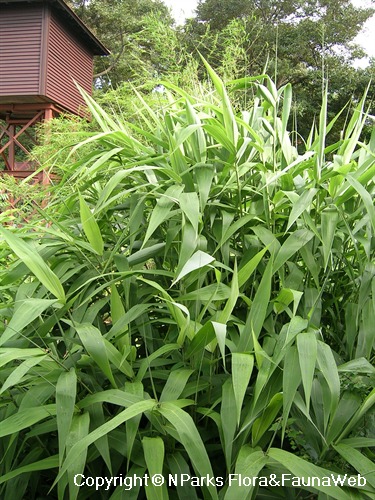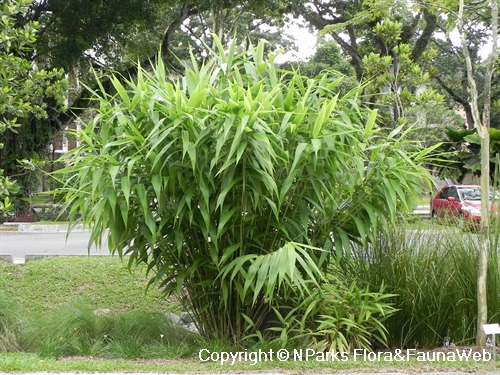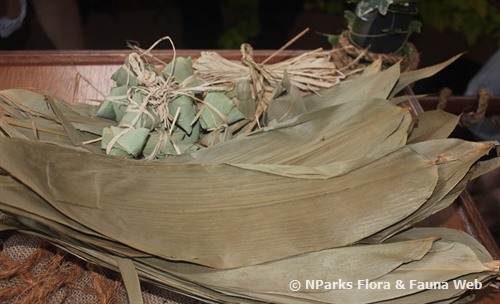
Back
Thysanolaena latifolia (Roxb. ex Hornem.) Honda
| Family Name: | Poaceae (Gramineae) |
| Synonyms: | Melica latifolia Roxb. ex Hornem., Thysanolaena maxima (Roxb.) Kuntze, Thysanolaena agrostis Nees, nom. illeg. superfl., Agrostis maxima Roxb., nom. nud. |
| Common Name: | Tiger Grass, Asian Broom Grass, Rumput Buloh, Rumput Teberau, Buloh Terbau, Bulu Tebrau |
Tiger Grass (Thysanolaena latifolia) is a bamboo-like grass with long leathery leaves reaching up to 65 cm long. Their leaves and some from other species are used to wrap glutinous rice dumplings or Zongzi (in Chinese), which are traditionally eaten during the Dragon Boat Festival. The leaves of Tiger Grass are reported to have antiseptic properties that help to extend the shelf life of rice dumplings in warm and humid conditions.
Name
Classifications and Characteristics
| Plant Division | Angiosperms (Flowering Seed Plants) (Monocotyledon) |
|---|---|
| Plant Growth Form | Grass or Grass-like Plant |
| Lifespan (in Singapore) | Perennial |
| Mode of Nutrition | Autotrophic |
| Maximum Height | 1 m to 4 m |
Biogeography
| Native Distribution | India to southern China (Guangdong) to New Guinea |
|---|---|
| Native Habitat | Terrestrial (Riverine, Disturbed Area / Open Ground) |
| Preferred Climate Zone | Tropical |
| Local Conservation Status | Non-native (Horticultural / Cultivated Only) |
Description and Ethnobotany
| Growth Form | It is a perennial, clump-forming bamboo-like grass, up to 1 - 4 m tall. |
|---|---|
| Foliage | The leaves are boardly linear-lanceolate, reading 15 - 65 cm long and 40 - 80 mm wide. The leaf blades are smooth and leathery with collar-shaped, membraneous ligules. The leaves are arranged alternately along the culm. |
| Stems | The culms (aboveground stems of grasses and grass-like monocots) are arching and reed-like, up to 1 - 4 m, arising from short underground rhizomes. |
| Flowers | The inflorescence is a purplish-brown panicle with crowded spikelets. Each spikelet comprises 2 - 3 florets, each consisting of heavily reduced petals and sepals, anthers, and stigmas. The second lemma (the outermost of two bracts enclosing a grass floret) has a pilose margin. |
| Fruit | The fruit is an oblong caryopsis (a type of dry, indehiscent fruit, commonly known as a grain). |
| Habitat | It can be found on sunny to slightly shaded banks of rivers, open areas, and rocky places. |
| Taxonomy | It is monotypic, being the only recognised species in the genus. This species was previously sold under the name Thysanolaena textilis, an unrecognised name. |
| Cultivation | This species grows well in moist, well-drained, fertile soils under full sun or slight shade. Pruning is required after 3-4 years to clear dead culms and trapped leaves. It can be propagated by seeds and division. |
| Etymology | The genus Thysanolaena is derived from Ancient Greek thysano "brush", and -laena from chlaina "cloak", referring to the hair second lemma. The specific epithet latifolia means "broad leaf". |
| Ethnobotanical Uses | Timber & Products: In Philippines and most parts of Southeast Asia, the inflorescences are knotted together to make brooms. Others: In its native range, the dried leaves are used as a food wrapper, especially for glutinous rice dumplings, which are traditionally made during the fifth month of the lunar calendar to celebrate the Dragon Boat Festival. The leaves are also used as fodder for livestock. |
Landscaping Features
| Landscaping | This species is a good bamboo substitute in limited spaces. such as smaller parks and gardens. It is relatively compact and does not have the aggressive growth habit of true bamboos. It can be planted close together as a tall hedge for screening or on slopes to aid in soil stabilisation. |
|---|---|
| Desirable Plant Features | Ornamental Form |
| Landscape Uses | General, Parks & Gardens, Hedge / Screening, Slope Stabilization |
Plant Care and Propagation
| Light Preference | Full Sun |
|---|---|
| Water Preference | Moderate Water |
| Plant Growth Rate | Fast to Moderate |
| Rootzone Tolerance | Well-Drained Soils, Moist Soils, Fertile Loamy Soils |
| Propagation Method | Seed, Division |
Foliar
| Foliage Retention | Evergreen |
|---|---|
| Mature Foliage Colour(s) | Green |
| Young Flush Texture(s) | Raised / Sunken Veins, Smooth, Leathery |
| Foliar Type | Simple / Unifoliate |
| Foliar Arrangement Along Stem | Alternate |
| Foliar Shape(s) | Non-Palm Foliage (Linear, Lanceolate) |
| Foliar Venation | Parallel |
| Leaf Area Index (LAI) for Green Plot Ratio | 3.5 (Shrub & Groundcover - Monocot) |
Floral (Angiosperm)
| Flower & Plant Sexuality | Bisexual Flowers |
| Flower Colour(s) | Brown, Purple |
|---|---|
| Flower Texture(s) | Smooth |
| Flower Grouping | Cluster / Inflorescence |
| Flower Location | Terminal |
| Inflorescence Type | Panicle, Spikelet / Pseudospikelet / Compound Spike |
| Ovary Position | Superior / Hypogynous |
| Flowering Habit | Polycarpic |
Fruit, Seed and Spore
| Fruit Classification | Simple Fruit |
|---|---|
| Fruit Type | Indehiscent Dry Fruit , Caryopsis / Grain |
| Seed Quantity Per Fruit | Few (1-5) |
References
| References | Veldkamp, J.F., Duistermaat, H., Wong, K.M., & Middleton, D.J. (2019). Poaceae (Gramineae). Flora of Singapore, Volume 7. Singapore: National Parks Board. pp. 219-501. |
|---|
Image Repository
Others
| Master ID | 1219 |
|---|---|
| Species ID | 2512 |
| Flora Disclaimer | The information in this website has been compiled from reliable sources, such as reference works on medicinal plants. It is not a substitute for medical advice or treatment and NParks does not purport to provide any medical advice. Readers should always consult his/her physician before using or consuming a plant for medicinal purposes. |


